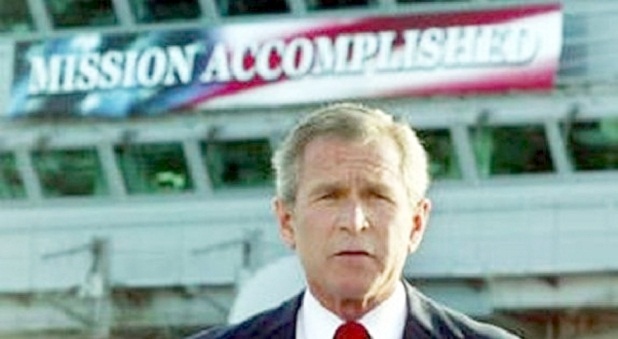Politics The US Army’s code of dishonour
New in Ceasefire - Posted on Wednesday, October 27, 2010 1:50 - 1 Comment
 By Nussaibah Younis
By Nussaibah Younis
On 1st May 2003, aboard the USS Abraham Lincoln, President George W. Bush congratulated US troops on the end of major combat operations in Iraq. He stated that the US army in Iraq had acted according to the “character of our military through history.”According to Bush the “decency and idealism” of the US military meant that “when Iraqi civilians looked into the faces of our servicemen and women, they saw strength and kindness and goodwill.”
Iraqi civilians facing torture, abuse and even murder in Iraqi prisons didn’t see kind American faces. They saw US troops looking the other way and evading their responsibility for the cruel treatment meted out to Iraqis in the aftermath of the invasion.
Bush was right about one thing. The behaviour of the US army in Iraq does indeed reflect the character of the US military through history. Nobody here in West Beirut has batted an eyelid at revelations of US human rights abuse complicity in Iraq. They remember 1982 when the US army returned to Lebanon in the aftermath of the Sabra and Shatila massacre. Up to 3,000 unarmed civilians had been murdered by Phalangist militia-men under the eyes of Israeli troops, just weeks after the US and its Israeli ally had promised to safeguard vulnerable Palestinian lives.
The guilt, embarrassment, and international outcry that ensued at the time persuaded the Americans that they ought to return to West Beirut as part of a multi-national peacekeeping force. Once in Lebanon, however, US troops immediately supported the Phalangist President Amin Gemayal, allowing his militia men to continue their campaign of domination in West Beirut via the Lebanese army. Robert Fisk reported at the time from Beirut that thousands of homes in the Western half of the city were being raided by the Lebanese army under the watch of US and French troops.
In the weeks and months following Sabra and Shatila, thousands of Palestinian and Lebanese men were arrested and transported to East Beirut for often violent interrogations or illegal deportations. Some of these prisoners “disappeared”; many are assumed to have been murdered. Palestinian camps and Shi’ite slums were subsequently bulldozed by the Lebanese authorities, in a clear attempt to force these traditional enemies of the Phalange out of Beirut. US troops stood by and did nothing. As the Wikileaks war logs show, the same policy applies in Iraq.
The similarities are striking: In 1982, the US explained that its role in Lebanon was to support the ‘official’ Lebanese government, and to assist the government in regaining control over Lebanese territory. Thirty years later, this is exactly how the current US administration justifies its failure to stop the excesses of Prime Minister Nouri al-Maliki’s government in Iraq.
The trouble is that – in times of civil war – ‘official government’ has no automatic claim to legitimacy. By backing the Lebanese government in 1982, the US was effectively backing Christian politicians and Christian militias against Shi’ite, Sunni and Palestinian groups in West Beirut. Similarly, by backing Maliki since 2006, the US was supporting predominately Shi’ite politicians and their militias – the Badr brigade and the Mahdi army – against the Sunnis.
The truth is the political claims of Iraqi ‘insurgents’ can often be valid, just as the behaviour of ‘official’ forces is often criminal. However, the US policy of picking a side, bolstering its official legitimacy, and allowing it to crush its opponents is immoral and unjust.
 Of course, there is a simple reason why this continues to be US policy. The US army is not accountable to the Iraqis; it is accountable to American voters.
Of course, there is a simple reason why this continues to be US policy. The US army is not accountable to the Iraqis; it is accountable to American voters.
The military strives – therefore –to achieve its political objectives as quickly, as cheaply and in as PR-friendly a way as possible.
Unfortunately for many Iraqis, the easiest way for the US military to get this job done is to pick a strong local side to do its bidding, to make that side stronger, and let it get on with crushing the opposition in whatever way it chooses.
For the Iraqis, a fair, representative, and sovereign government may be more important than government at any cost – but as long as the US army is not accountable to them, their wishes remain totally irrelevant.
Wikileaks’ Iraq war logs have tragically demonstrated the amoral (and often immoral) nature of invading armies – a lesson that we cannot afford to ignore yet again. Even setting aside the many ethical and legal concerns over the 2003 invasion itself, without being directly accountable to the Iraqis the American army was never going to act in the interests of the civilian population it was claiming to have “liberated”.
Whether we like it or not, that is the character of the military through history. It does not, however, mean that we have to accept it.
 Nussaibah Younis is a doctoral candidate in international relations, a freelance researcher and a journalist based in Beirut and London.
Nussaibah Younis is a doctoral candidate in international relations, a freelance researcher and a journalist based in Beirut and London.


Excellent article, it’s really interesting to see you drawing parallels in Iraq with what took place in Lebanon in the 80s. As you rightly indicated, it is only one of many examples of brutal US military history.
It can be easy to become pessimistic about this when you see its recursive nature in history – how do we break the cycle?